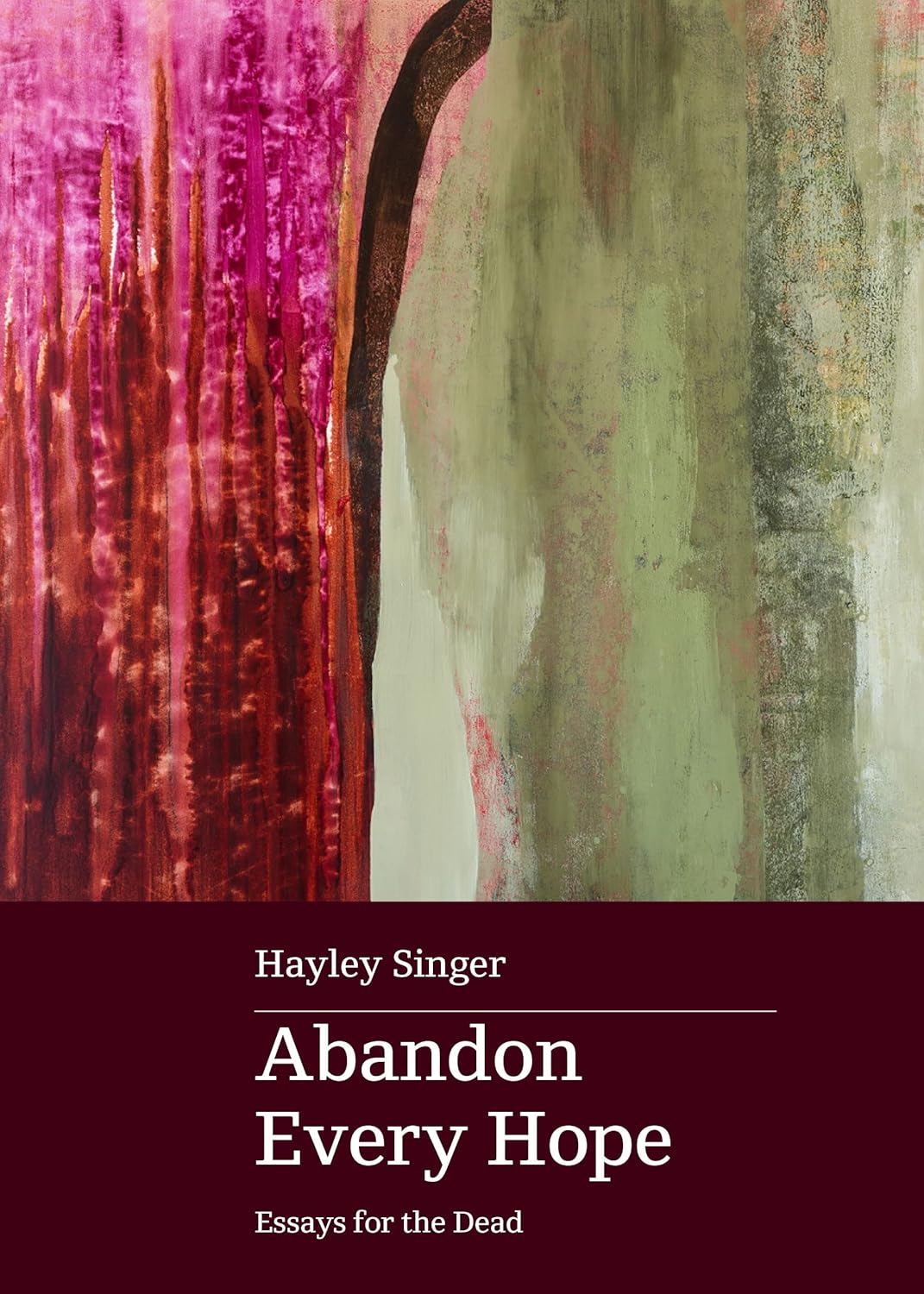Review of Abandon Every Hope: Essays for the Dead by Hayley Singer

Abandon Every Hope: Essays for the Dead
Hayley Singer
Upswell, 2023, 176 pages
$23.09
Reviewed by Gabe Tejada
Abandon Every Hope is a poetic meditation on violence. The title of Hayley Singer’s book of essays may conjure up Dante’s words, yet while “Abandon all hope, ye who enter” serves as an ominous warning, Singer’s “Abandon every hope” is more plaintive advice. Though hell is evoked through explicit descriptions of inhumane acts to which non-human beings are subjected, the horror of violence is never crass. Grief and introspection are allowed to take up space—a silence concomitant with the racket of violence.
Singer wields this silence in a way that amplifies the cruelty and tragedy inherent in the subject matter of the book—violence against animals, including human ones—without rendering their discourse cliché. The structure of the thanatography, with its pockets of pause between paragraphs embodied by ellipsis, allows for silence to be represented on the page. For Singer, in order to write about violence against animals, one must chart a “language of abandonment” (37). And since abandonment is a “mode of disappearance” (42), its language requires silence. But even as silence stands for the void left behind, it also echoes the means of mass death that causes these absences. These silences are the colourless, odourless carbon monoxide used by meat processing corporations to gas thousands of pigs to deal with the COVID-19 “backlog” (147-155). These silences are the “mediating apparatuses” that “disfigure[] (and shield[] us from) violence” (130). These silences are the non-language of non-human animals that render their pain invisible and unheard.
These silences bored into the body of the text are points of expansion, “drill(ed) holes into language” (81) that allow for “the place of erasure, absence” (83) to take up space in the present. In Singer’s prose-poetry, silence is part of meaning and expression—a harkening to their practice of “writing at the edge of what’s publishable.” As Abandon Every Hope traverses the boundaries segregating human and animal, presence and absence, life and death, it challenges the “immunitary defence(s) against animality” (62) we’ve used to impose—and justify—our supremacy.
Just as silence becomes an integral part of the language of abandonment, so too does it become part of the language of return and reconciliation. Here, silence also stands for Singer’s immobility in the face of such ubiquitous violence, even the violence to which they subject themself. Weaving in their struggle with alcoholism and depression lends a personal, vulnerable bend to the interspecies harm perpetrated by the animal-industrial complex (AIC). We are drowned, just as Singer is, in a perpetual cycle of coping against the atrocities surrounding us and the escalation of these atrocities, driving us to “navigate the infinity between wanting and doing with sharper instruments” (58). The vulnerability of their failure is a point of connection with the reader, just as it shows how deeply connected Singer is to animal liberation. Despite drawing parallels between their personal struggle and the violence inflicted on animals and those most affected by the AIC, Singer never veers into self-indulgence. Singer recognizes their privilege and acknowledges that the “meat processing workforce… is largely made of immigrants and refugees” (149), those most vulnerable in our white-supremacist and racist societies. Many human animals, as critical race studies scholars Eve Tuck and C. Ree write, “have been (and continue to be) made killable” (76), just as non-human animals are.
There is no comfort at the end of Singer’s book. No hope for change or a better future. The last sentence of the final essay, an unnamed company’s slogan—“A cut above the rest” (155)—insinuates violence coming from a place of such height and power that it can never be stopped. But hopeless as these essays may be, they marry literary invention and political imaginings. Singer displaces comfortability as a locus for political thought and action, insisting that fighting for collective liberation—even when abandoned by every hope—must be done.
Gabe Tejada is a Filipino reader and writer based in Naarm. His work has been published by Archer Magazine online and Kill Your Darlings (KYD), among others. You can find him reading queer books on the 58 tram, going for aimless walks, and eating camembert stuffed croissants.
"Empowerment comes from ideas."
― Charlene Carruthers
"Your silence will not protect you."
— Tourmaline
"Gender is the poetry each of us makes out of the language we are taught."
— Leila Raven


